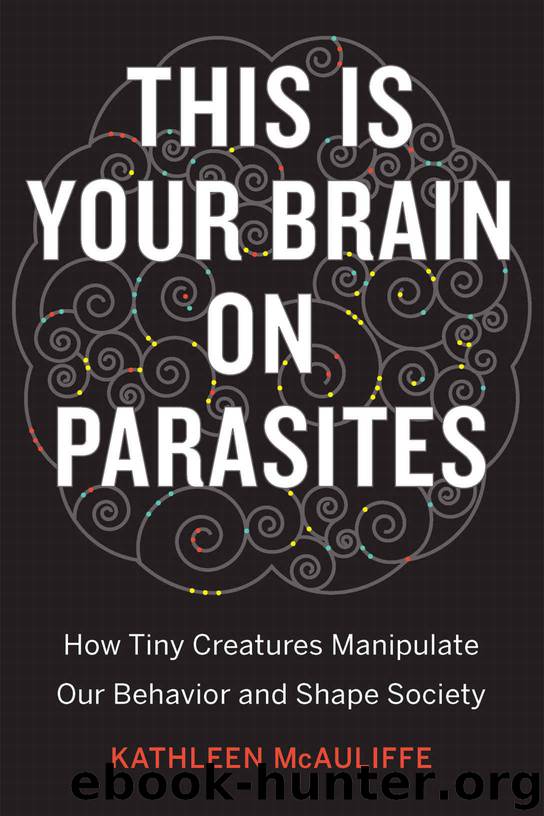This Is Your Brain on Parasites: How Tiny Creatures Manipulate Our Behavior and Shape Society by Kathleen McAuliffe

Author:Kathleen McAuliffe
Language: eng
Format: mobi, epub, azw3
Publisher: Houghton Mifflin Harcourt
Published: 2016-06-07T06:00:00+00:00
SLEEP IS A PUZZLE that has occupied many great minds, for, just like sex, its evolutionary benefits are far from obvious. When deep in slumber, we are highly vulnerable to predators, and the extended blackouts cut down on time spent foraging for food, searching for mates, and caring for children. So why spend so many hours in this dangerous and unproductive manner?
A novel theory posits that sleep evolved to shunt resources that would normally sustain waking activities toward the immune system. Recall that people sleep more when fighting an infection to meet the defense system’s increased demand for fuel. In times of peace, the army still needs to be fed and the troops replenished. Indeed, immune cells gobble up nutrients at a ferocious pace and have rapid turnover rates. One major type, the granulocyte, is so short-lived that these cells must be replaced every two to three days. Even when we’re healthy, according to this view, a daily period of inactivity is essential for covering the steep energy costs involved in keeping the war machine ready for battle.
The immune theory of sleep, as it’s been dubbed, aligns with the wisdom of mothers, who have long been telling their children to get a good night’s rest, intuitively grasping sleep’s necessity for staying well. The theory is also gaining support from several lines of research.
Sleep deprivation, animal studies show, does indeed increase susceptibility to infection. Also consistent with that observation, insufficient sleep immediately before or after receiving a vaccine reduces the body’s immune response by half, greatly diminishing the protective benefits of inoculation—something to keep in mind when you’re due for your next flu shot. Perhaps the most persuasive evidence that sleep boosts our resistance to parasites comes from research conducted by an international team of evolutionary biologists led by Charles Nunn and Brian Preston. The group gathered data on the sleep habits of twenty-six species of mammals with daily hours of slumber ranging from a skimpy 3.8 in sheep to a luxurious 17.6 in hedgehogs. The scientists found that across these species, more sleep strongly correlated with enhanced immune function as measured by the number of immune cells circulating in their blood. What’s more, the longer a species typically dozes, the lower its level of parasitic infection.
Traditional theories of sleep underscore its importance in consolidating memory and learning, as well as its role in removing waste products from the brain. As there’s strong support for these ideas too, it appears that sleep may well rejuvenate both the brain and the immune system.
That means skimping on it, as so many of us do, may be inviting double trouble.
Download
This Is Your Brain on Parasites: How Tiny Creatures Manipulate Our Behavior and Shape Society by Kathleen McAuliffe.epub
This Is Your Brain on Parasites: How Tiny Creatures Manipulate Our Behavior and Shape Society by Kathleen McAuliffe.azw3
This site does not store any files on its server. We only index and link to content provided by other sites. Please contact the content providers to delete copyright contents if any and email us, we'll remove relevant links or contents immediately.
| Cell Biology | Developmental Biology |
| Entomology | Marine Biology |
| Microbiology | Molecular Biology |
| Biostatistics |
Sapiens: A Brief History of Humankind by Yuval Noah Harari(13053)
The Tidewater Tales by John Barth(12030)
Do No Harm Stories of Life, Death and Brain Surgery by Henry Marsh(6336)
Mastermind: How to Think Like Sherlock Holmes by Maria Konnikova(6236)
The Thirst by Nesbo Jo(5785)
Why We Sleep: Unlocking the Power of Sleep and Dreams by Matthew Walker(5642)
Sapiens by Yuval Noah Harari(4537)
Life 3.0: Being Human in the Age of Artificial Intelligence by Tegmark Max(4507)
The Longevity Diet by Valter Longo(4445)
The Rules Do Not Apply by Ariel Levy(3906)
The Immortal Life of Henrietta Lacks by Rebecca Skloot(3826)
The Body: A Guide for Occupants by Bill Bryson(3802)
Why We Sleep by Matthew Walker(3773)
Animal Frequency by Melissa Alvarez(3755)
Yoga Anatomy by Kaminoff Leslie(3701)
Barron's AP Biology by Goldberg M.S. Deborah T(3632)
The Hacking of the American Mind by Robert H. Lustig(3580)
All Creatures Great and Small by James Herriot(3516)
Yoga Anatomy by Leslie Kaminoff & Amy Matthews(3396)
